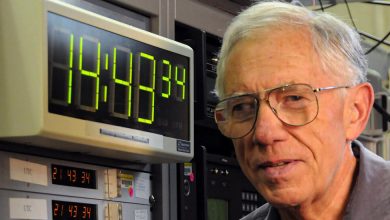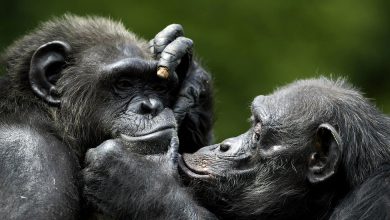Make Science, Not War, Scientists Say

One of the glories of international scientific collaborations, besides sharing costs and brainpower, is the building of personal relationships that transcend individual cultures, traditions and political regimes.
At the European Organization for Nuclear Research, or CERN, outside Geneva, Switzerland, scientists still delight in describing the diverse array of peoples — Israelis and Iranians; Hindus, Muslims, atheists and Catholics — who worked side-by-side a decade ago to discover the Higgs boson, the key to mass in the universe. Astronauts take pride in the brotherhood of the cosmos symbolized by ceremonial exchanges of bread and salt when crews arrive at the International Space Station.
These ties are now being threatened as opposition to Russia’s invasion of Ukraine continues to grow in scientific circles — even in Russia, where use of the word “invasion” in regard to Ukraine is now a crime. Conferences and academic exchanges have been canceled. Open letters from winners of the Nobel Prize and other groups have proliferated. The Russian and American space programs, which have been intertwined for 30 years, now seem destined to go their separate ways.
Last week the waves of condemnation reached CERN, long an avatar of the dream of international collaboration. In a meeting of its governing body, the CERN Council, on Tuesday, the lab said it would not engage in any new collaborations with the Russian Federation “until further notice” and suspended it from its observer status at the lab.
“CERN was established in the aftermath of World War II to bring nations and people together for the peaceful pursuit of science,” read a statement released by the council on March 8. “This aggression runs against everything for which the Organization stands.”
This followed an announcement in late February that the International Congress of Mathematicians, scheduled for Saint Petersburg in July, would instead be held virtually. The Congress, which occurs every four years, is the biggest gathering in math. An in-person assembly and awards ceremony will happen at a place to be determined outside Russia.
Protests have not been confined to the West. On Feb. 24, Russian scientists and science journalists posted an open letter to the website Troitskiy Variant, an independent science publication in Russia, calling the invasion of Ukraine “unfair and frankly senseless.”
“Having unleashed the war, Russia doomed itself to international isolation, to the position of a pariah country,” the letter noted. “This means that we, scientists, will no longer be able to do our job normally: After all, conducting scientific research is unthinkable without full cooperation with colleagues from other countries.”
Some 7,750 Russians have signed the letter, according to Andrei Linde, a Stanford cosmologist from Russia and one of the signatories. After the Russian parliament made it a criminal offense worth as much as 15 years in prison to call the invasion of Ukraine anything but a “special military operation,” the letter disappeared from that website, but it can still be found on the Wayback Machine.
A subsequent post, which Dr. Linde steered me to and translated, listed the signers of the letter but not the letter itself. “There is nothing criminal in the text of the letter,” the new post read. “However, due to the new legislation, which actually introduces the most severe censorship, we remove the text of the letter, leaving signatures, believing that it is important for the signatories to let people know that they have not kept silent.”
That post, too, has disappeared. “It’s so depressing,” Dr. Linde said.
Another embarrassment for Russia came when Oleg Anisimov, a climatologist at the State Hydrological Institute in Saint Petersburg who headed the Russian delegation to a Feb. 27 meeting of the U.N. Intergovernmental Panel on Climate Change, interrupted his talk before the representatives from 195 nations to apologize to the citizens of Ukraine for the attack.
“Let me present an apology on behalf of all Russians who were not able to prevent this conflict,” Dr. Anisimov said at the meeting. “Those who know what is happening fail to find any justification for the attack.”
The condemnation from CERN was particularly stinging in its symbolism.
The laboratory was formed in 1954 to help bind a war-torn Europe, and the effort has been splendidly spectacular. Its Large Hadron Collider rules the roost in particle physics; the collider’s discovery of the long-sought Higgs boson a decade ago resonated globally. And the World Wide Web was invented at CERN, as a way to allow physicists to easily share their data.
In all, scientists from 100 nations and territories participate in the lab’s operations. The laboratory is governed by a council of 23 member states, each of which sends to delegates, a scientist and a diplomat, to the counsel. Each state has one vote. Russia is not a member but, like the U.S. and Japan, it has held observer status, meaning it could send delegations to meetings but not vote. Ukraine is among seven associate members. Expelling a member or observer state requires a two-thirds vote; the count is confidential.
Eliezer Rabinovici, a theoretical physicist at the Hebrew University in Jerusalem who is the president of the CERN Council, called its meeting this week “extraordinary.”.
“I am overwhelmed by decisions to be taken,” he said in an email in the days before the meeting occurred.
“I think what happened now took many many by surprise,” Dr. Rabinovici recalled afterward. “They could not believe that some atrocities could happen in 21st-century Europe.” He described “some tension,” with delegates wanting “to express their sympathy and their anger” but concerned about harming the collaborative ethos of CERN in the long run.
Fabiola Gianotti, the director-general of CERN, recalled in a statement that CERN’s mission was to build bridges between countries. “In times of aggression, war and political divide,” she said, “science and the arts can play the role of keeping communication channels open. Such channels will be essential to building back when the time comes.”
The decision elicited support from a sample of physicists contacted by phone and email. “In comparison to what is going on in Ukraine, suspension of the observer status of the Russian Federation at CERN is a relatively minor issue,” Dr. Linde said.
Pierre Ramond, a physicist at the University of Florida and one of the innovators of string theory, wrote: “CERN’s decision was necessary. The lack of any would have been a black mark: CERN is more than a scientific marvel, it was and remains the first symbol of the post-WW2 new Europe.”
Kip Thorne, a physicist at the California Institute of Technology who won a Nobel Prize in 2017 for the discovery of gravitational waves, has working relationships with Russian astrophysicists that date from the 1960s.
“I believed then and I believe now that those contacts are of high importance,” he said in an email. “However, what Putin and the Russian military have done in the name of the Russian Federation is so egregious that I strongly support the CERN Council’s decision.”
What all this means for individual scientists at CERN is unclear. In a note to the lab, Dr. Gianotti insisted that nobody was being sent home and that ongoing collaborations were being maintained, at least for now.
Russia-Ukraine War: Key Things to Know
On the ground. Russian forces, battered by the local resistance, have stepped up their bombardment across Ukraine, targeting locations far from the front lines. Satellite imagery of a convoy north of Kyiv suggests that Russia is repositioning its forces for a renewed assault there.
A punishing measure. In a move to escalate the economic pain on Russia, President Biden called on Congress to suspend normal trade with the country, in a coordinated move with the Group of 7 and the E.U. The change that would raise tariffs for many Russian products.
Iran nuclear deal. A European Union official said that talks on reviving the 2015 deal had paused following the invasion. Russia, a signatory to the accord, has tried to use final approval of the deal as leverage to soften sanctions imposed because of the war.
Disinformation push. Russia falsely claimed that the Pentagon was financing biological weapons labs in Ukraine — a lie repeated by Chinese diplomats. The Biden administration called out both countries, saying the United States might provide cover for a potential biological or chemical weapons attack on Ukrainians by Russia.
Joseph Incandela, a physicist at the University of California, Santa Barbara, who led one of the teams that discovered the Higgs boson, elaborated. “Those who are here can continue to come to the lab and do their work,” he said. “Those who come in from Russia can still get here via somewhat more circuitous flight paths if they are allowed to do so by Russian authorities. They are not restricted from entering CERN.”
However, Lisa Randall, a theoretical physicist at Harvard, noted in an email: “Given there are no flights, and presumably equipment transfers won’t happen, I am not sure about the implications of continued collaboration.”
Thus far, CERN’s plans to restart the Large Hadron Collider in April, following three years of repairs and improvements, remain on track, according to Mike Lamont, CERN’s director for accelerators and technology,
So the promise of a narrow bridge of communication survives. In an email, Michael Turner, a physicist with the Kavli Foundation in Los Angeles and past president of the American Physical Society, stressed the value of these informal working relationships. “Scientists are often very influential members of their societies,” he noted, and their interactions are a reminder “of the humanity of all individuals, even those in countries whose leaders are doing outrageous things.”
“That being said,” he added, with regard to Russia’s actions, “I think the entire world is trying to figure out what to do.”

Sync your calendar with the solar system
Never miss an eclipse, a meteor shower, a rocket launch or any other astronomical and space event that’s out of this world.

Exploring the Solar System
A guide to the spacecraft beyond Earth’s orbit.





